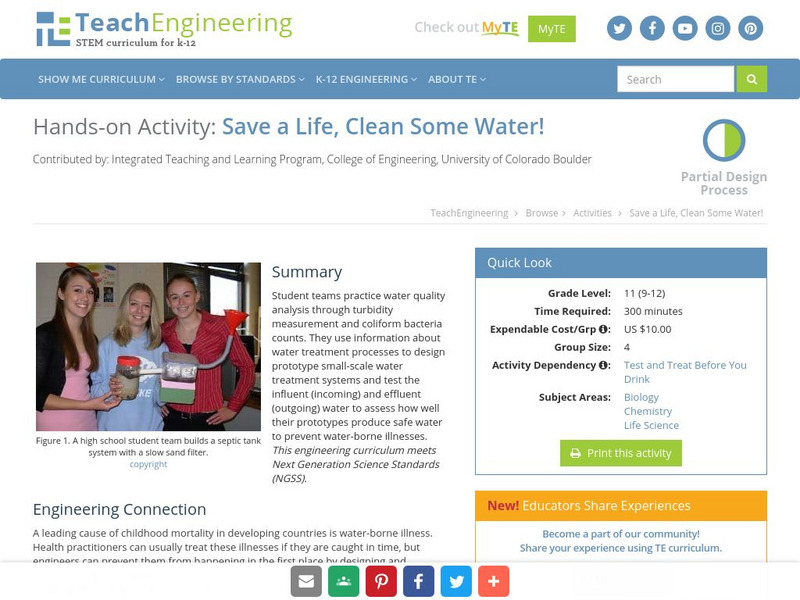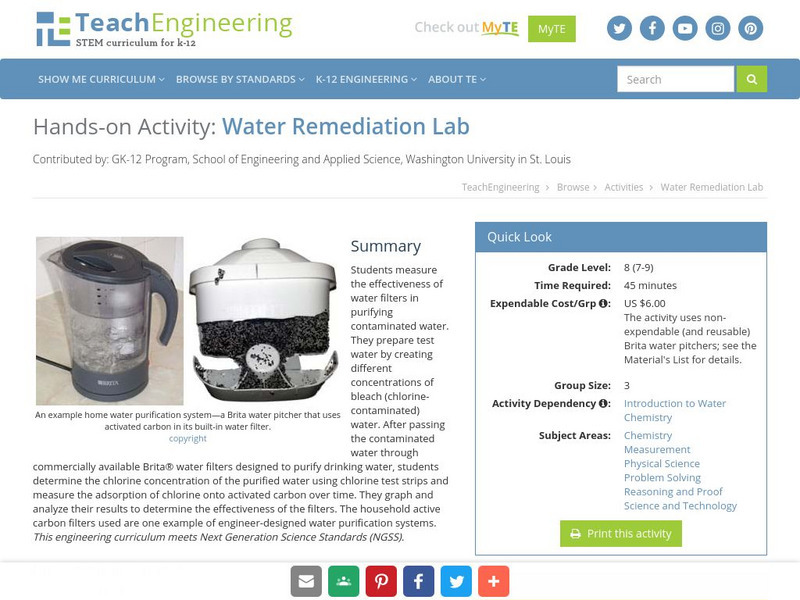Science Education Resource Center at Carleton College
Serc: Investigating Ponds and Streams: How Clean Is Our Water?
In this field lab, students investigate the differences in three city ponds. Students will compare pond life, temperature, pH, Ammonia, dissolved oxygen, and Nitrate. The student use the pond sheets (Flinn Scientific Catalog 2007) to...
Other
Wet in the City: A Recipe for Clean Water [Pdf]
In this hands-on lesson, middle schoolers will examine the labels on common household products to determine what hazardess chemicals they contain, then test less toxic alternatives to see their affects on water quality. Students will...
TeachEngineering
Teach Engineering: Save a Life, Clean Some Water!
Student teams practice water quality analysis through turbidity measurement and coliform bacteria counts. They use information about water treatment processes to design prototype small-scale water treatment systems and test the influent...
TeachEngineering
Teach Engineering: Would You Drink That?
This activity focuses on getting students to think about bacteria, water quality and water treatment processes. Students develop and test their hypotheses about the "cleanliness" of three water samples prepared by the teacher. Then they...
TeachEngineering
Teach Engineering: Things That Matter to Flocculants
Prior to reaching households, water is exposed to a variety of treatments designed to render it fit for human consumption and use. One of the first treatment steps is the removal of suspended solids using chemical additives called...
TeachEngineering
Teach Engineering: Grow Your Own Algae!
Students discover how tiny microscopic plants can remove nutrients from polluted water. They also learn how to engineer a system to remove pollutants faster and faster by changing the environment for the algae.
TeachEngineering
Teach Engineering: Water Remediation Lab
Students measure the effectiveness of water filters in purifying contaminated water. They prepare test water by creating different concentrations of bleach (chlorine-contaminated) water. After passing the contaminated water through...
TeachEngineering
Teach Engineering: Environmental Engineering and Water Chemistry
Students are introduced to the fundamentals of environmental engineering as well as the global air, land and water quality concerns facing today's environmental engineers. After a lesson and activity to introduce environmental...
TeachEngineering
Teach Engineering: Ocean Water Desalination
Students learn about the techniques engineers have developed for changing ocean water into drinking water, including thermal and membrane desalination. They begin by reviewing the components of the natural water cycle. They see how...
TeachEngineering
Teach Engineering: Test and Treat Before You Drink
Students learn about water quality testing and basic water treatment processes and technology options. Biological, physical and chemical treatment processes are addressed, as well as physical and biological water quality testing,...
TeachEngineering
Teach Engineering: Flocculants: The First Step to Cleaner Water!
Students experience firsthand one of the most common water treatment types in the industry today, flocculants. They learn how the amount of suspended solids in water is measured using the basic properties of matter and light. In...
TeachEngineering
Teach Engineering: A Matter of Leaching
Students leach organic matter from soil to create a water sample with high dissolved organic matter content (DOM), and then make filters to see if the DOM can be removed. They experience the difficulties of removing DOM from water, and...
TeachEngineering
Teach Engineering: Where's the Water?
In this instructional activity, the students will conduct an investigation to purify water. Students will engineer a method for cleaning water, discover the most effective way to filter water, and practice conducting a scientific...
TeachEngineering
Teach Engineering: All About Water!
Students learn about the differences between types of water (surface and ground), as well as the differences between streams, rivers and lakes. Then, they learn about dissolved organic matter (DOM), and the role it plays in identifying...
TeachEngineering
Teach Engineering: Human Water Cycle
Learners learn about the human water cycle, or how humans impact the water cycle by settling down in civilizations. Specifically, they learn how people obtain, use and dispose of water. Students also learn about shortages of treated,...
My Science Site
Environment Canada: Clean Water: Life Depends on It! [Pdf]
An extensive lesson unit on water quantity and quality and why it is important in relation to human life. Provides lessons that incorporate language, social studies, geography, and health. Tests are also provided. This is one chapter of...
PBS
Pbs Learning Media: Why We Should Protect Freshwater Mussels
In this interactive lesson, students will increase their understanding of the important role that freshwater mussels play in our watershed. Students will learn about freshwater mussel species, how mussels improve water quality in rivers...
Thinkport Education
Thinkport: Water, Water, Everywhere: Introduction
An introduction to an investigation of real-world problems to develop viable solutions to global access to clean water.
Thinkport Education
Thinkport: Water, Water, Everywhere?
Students learn about global access to clean water and apply the engineering design process to develop a solution to purify water.
Read Works
Read Works: A Clean Drink of Water
[Free Registration/Login Required] An informational about people in a South American village who needed clean water to drink. A question sheet is available to help students build skills in reading comprehension.
TryEngineering
Try Engineering: Filtration Investigation
Working in teams of "engineers", students learn about filtration systems and how they can remove impurities from drinking water.
Other
Filter of Hope: Clean Water of Life
Filter of Hope has developed a revolutionary, household water filter specifically for families living in abject poverty (less than $2/day) worldwide. Our filter removes all bacteria, protozoa and microorganisms from contaminated water...
PBS
Pbs Design Squad: Lead Detecting Device
See how a design of a cheap and portable device can find lead in water.
Science Buddies
Science Buddies: How to Harvest Water From Fog
In this activity, you will learn about a creative way to collect water from the air.



![Wet in the City: A Recipe for Clean Water [Pdf] Lesson Plan Wet in the City: A Recipe for Clean Water [Pdf] Lesson Plan](https://d15y2dacu3jp90.cloudfront.net/images/attachment_defaults/resource/large/FPO-knovation.png)
















